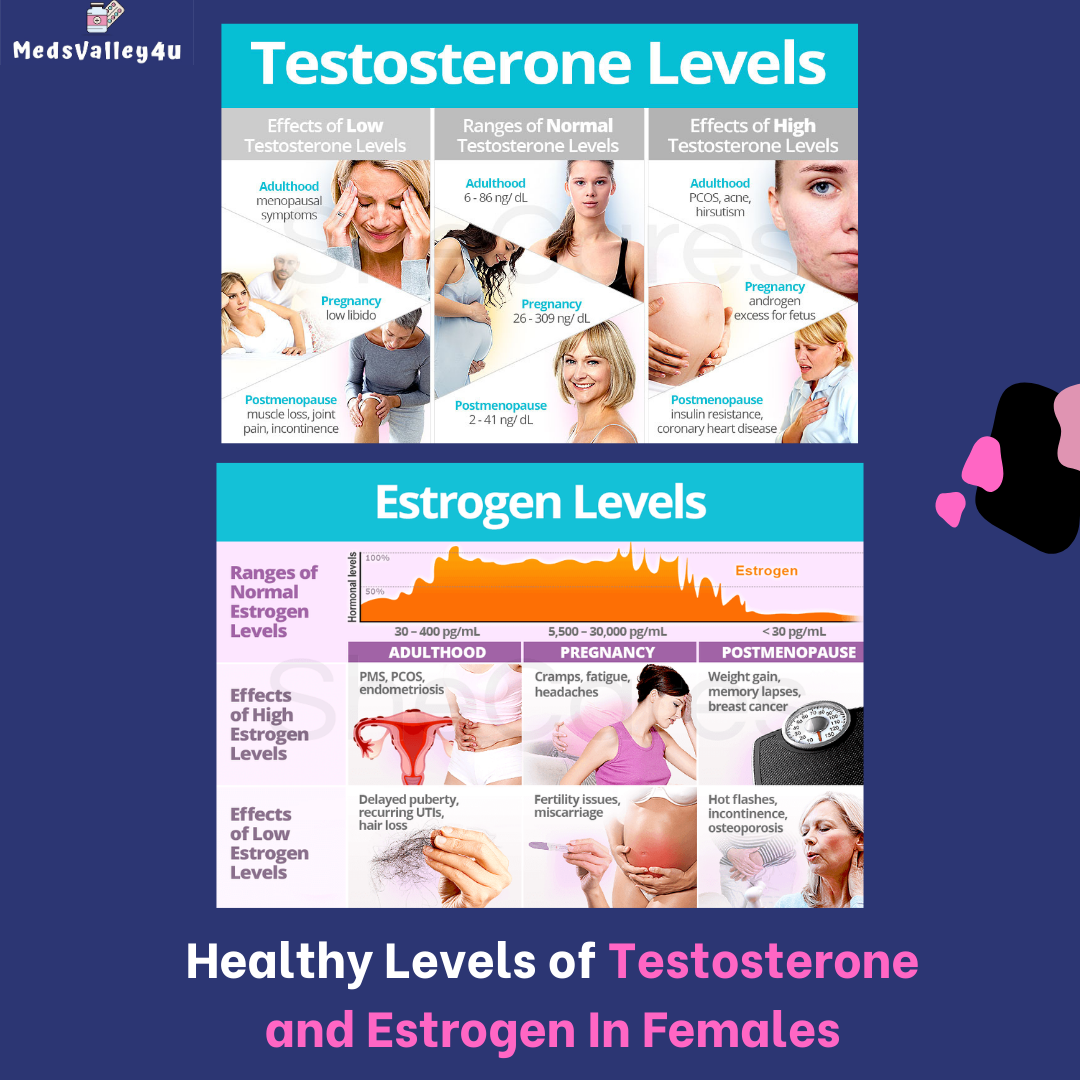Hormones play a critical role in the overall health and well-being of women, influencing everything from mood and energy levels to reproductive health and bone density. Among these hormones, testosterone and estrogen are particularly significant, as they are involved in numerous bodily functions. While often associated with male health, testosterone is also vital for women, just as estrogen is essential for males. Understanding the healthy levels of these hormones in females, their functions, and how to maintain balance is crucial for optimal health.
Understanding Testosterone and Estrogen
What is Estrogen?
Estrogen is a group of hormones that play a key role in the development and regulation of the female reproductive system and secondary sexual characteristics. The primary types of estrogen include estradiol, estrone, and estriol, with estradiol being the most potent and prevalent form in premenopausal women.
Functions of Estrogen
- Reproductive Health: Estrogen is vital for the menstrual cycle, helping regulate ovulation and preparing the uterus for potential pregnancy. It also influences libido and sexual function.
- Bone Health: Estrogen plays a significant role in maintaining bone density. It helps prevent bone loss by promoting the activity of osteoblasts, the cells responsible for bone formation.
- Heart Health: Estrogen is thought to have a protective effect on the cardiovascular system by helping maintain healthy cholesterol levels and promoting good blood circulation.
- Mood Regulation: Estrogen influences neurotransmitter systems in the brain, impacting mood, cognition, and emotional well-being.
Healthy Levels of Estrogen
Normal estrogen levels in females can vary based on age, menstrual cycle phase, and life stage. Typical ranges for estradiol levels are:
- Follicular Phase: 30 to 400 pg/mL
- Ovulatory Phase: 100 to 500 pg/mL
- Luteal Phase: 100 to 400 pg/mL
- Postmenopausal: < 30 pg/mL
Maintaining balanced estrogen levels is essential for reproductive health and overall wellness.
Understanding Testosterone
What is Testosterone?
Testosterone is often referred to as a male hormone, but it is also crucial for women’s health. It is produced in the ovaries, adrenal glands, and peripheral tissues. While testosterone levels in women are significantly lower than in men, they play an essential role in various bodily functions.
Functions of Testosterone
- Sexual Health: Testosterone is involved in sexual arousal, libido, and the overall sexual experience. Low levels can lead to reduced sexual desire and satisfaction.
- Muscle and Bone Health: Testosterone contributes to muscle mass and strength. It helps maintain bone density and prevent osteoporosis by promoting the formation of new bone tissue.
- Mood and Energy Levels: Testosterone affects mood regulation and energy levels. Low testosterone levels have been linked to fatigue, depression, and anxiety.
- Cognitive Function: Emerging research suggests that testosterone may play a role in cognitive function, including memory and focus.
Healthy Levels of Testosterone
Normal testosterone levels in women can vary based on age and other factors. Typical ranges for testosterone levels are:
- Normal Range: 15 to 70 ng/dL
- Postmenopausal Women: Levels may drop to 5 to 20 ng/dL
Maintaining healthy testosterone levels is essential for physical and emotional well-being.
The Importance of Hormonal Balance
Both estrogen and testosterone work synergistically in the body. A delicate balance between these hormones is crucial for overall health. An imbalance can lead to various health issues, including:
- Low Estrogen Levels: This can lead to symptoms such as hot flashes, night sweats, vaginal dryness, mood swings, and increased risk of osteoporosis and cardiovascular diseases.
- Low Testosterone Levels: Women may experience fatigue, decreased libido, loss of muscle mass, and mood changes.
- High Estrogen Levels: Elevated estrogen levels can lead to weight gain, irregular menstrual cycles, and an increased risk of hormone-related cancers.
- High Testosterone Levels: Excess testosterone can cause symptoms such as acne, excessive hair growth (hirsutism), irregular periods, and increased aggression.
Factors Affecting Hormonal Levels
Several factors can influence estrogen and testosterone levels in females:
- Age: Hormonal levels fluctuate throughout a woman’s life, particularly during puberty, the menstrual cycle, pregnancy, and menopause.
- Body Composition: Body fat plays a role in hormone levels. Excess body fat can lead to increased estrogen levels, while low body fat can reduce testosterone production.
- Diet and Nutrition: A balanced diet rich in nutrients supports hormonal health. Healthy fats, lean proteins, and a variety of fruits and vegetables are essential.
- Stress: Chronic stress can lead to hormonal imbalances by increasing cortisol levels, which can inhibit testosterone production and disrupt estrogen balance.
- Exercise: Regular physical activity can help regulate hormone levels. However, excessive exercise can lead to hormonal imbalances, particularly in women.
- Medical Conditions: Conditions such as polycystic ovary syndrome (PCOS), thyroid disorders, and certain tumors can affect hormone levels.
How to Maintain Healthy Hormonal Levels
Maintaining healthy levels of testosterone and estrogen is crucial for overall well-being. Here are some effective strategies:
1. Balanced Diet
- Incorporate Healthy Fats: Include sources of omega-3 fatty acids (like fish, walnuts, and flaxseeds) and monounsaturated fats (such as olive oil and avocados) in your diet.
- Eat Whole Foods: Focus on whole, nutrient-dense foods like fruits, vegetables, whole grains, and lean proteins. These provide essential vitamins and minerals that support hormonal health.
- Limit Processed Foods: Reduce the intake of sugary snacks, refined carbohydrates, and processed foods, which can contribute to hormonal imbalances.
2. Regular Exercise
- Engage in Strength Training: Resistance exercises help maintain muscle mass and promote testosterone production.
- Incorporate Cardiovascular Activities: Regular aerobic exercise supports cardiovascular health and helps regulate hormone levels.
3. Manage Stress
- Practice Relaxation Techniques: Incorporate mindfulness practices, meditation, and yoga to manage stress levels and reduce cortisol production.
- Prioritize Sleep: Aim for 7-9 hours of quality sleep each night, as inadequate sleep can disrupt hormone production and balance.
4. Routine Check-ups
- Regular Hormonal Testing: If you experience symptoms of hormonal imbalance, consult a healthcare professional for testing. Regular check-ups can help monitor hormone levels and overall health.
5. Consider Supplements Wisely
- Consult a Professional: If dietary changes are insufficient, consider supplements under the guidance of a healthcare professional. Vitamins and minerals like vitamin D, magnesium, and omega-3 fatty acids can support hormonal health.
Conclusion
Healthy levels of testosterone and estrogen are vital for women’s overall health and well-being. Understanding the functions of these hormones, their normal ranges, and the factors that affect their balance is crucial for maintaining optimal health. By adopting a balanced diet, engaging in regular physical activity, managing stress, and seeking routine check-ups, women can support healthy hormonal levels and improve their quality of life. Emphasizing a holistic approach to health will empower women to thrive at every stage of life, from puberty to menopause and beyond.






Write a comment
Your email address will not be published. All fields are required